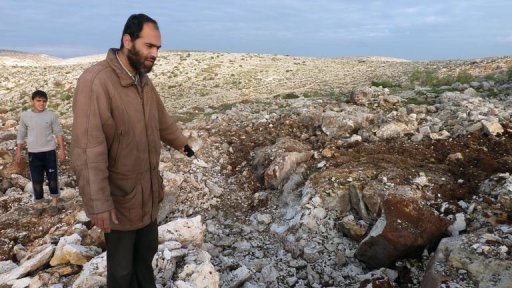
(AFP / Herve Bar)
(AFP) — Peace envoy Lakhdar Brahimi said Wednesday ahead of US-Russia talks on Syria that President Bashar al-Assad’s new plan for his embattled country is “more sectarian, more one-sided” than previous initiatives.
He spoke as the first major prisoner swap in the 21-month conflict took place, with rebels freeing 48 Iranians in exchange for more than 2,000 regime detainees in a drawn-out deal with Damascus reportedly brokered by Turkey, Qatar and Iran.
UN and Arab League envoy Brahimi was giving his first public reaction to a three-step plan announced by Assad on Sunday.
“What has been said this time is not really different and it is perhaps even more sectarian, more one-sided,” he told the BBC.
“What you need is reaching out and recognising that there is a… very serious problem between Syrians, and that Syrians have got to talk to one another to solve it,” Brahimi said.
Assad’s plan for a “political solution” in Syria was swiftly rejected by the opposition and Western nations as being detached from reality.
The plan offered a dialogue with the opposition to end the conflict — but only with elements he deemed acceptable, not rebel-affiliated groups he termed “killers” and “terrorists” led by foreigners.
Referring to the so-called Arab Spring that has swept the region since late 2010, Brahimi said: “Now people want to have a say in how they are governed. They want to take hold of their own future.”
“In Syria in particular, what people are saying is that one family ruling for 40 years is a little bit too long.”
The stinging comments came ahead of talks in Geneva on Friday between Brahimi and US and Russian officials.
“The trilateral meeting between (Russian Deputy Foreign Minister) Mikhail Bogdanov, (US Undersecretary of State) William Burns, and Lakhdar Brahimi has been planned for January 11 in Geneva,” Bogdanov told the Interfax news agency.
Wednesday’s developments came with no respite from the fighting, which in nearly 22 months of conflict has claimed some 60,000 lives, according to UN figures.
Four children from the same family were among as many as 10 civilians killed in a pre-dawn air strike near the central city of Homs, the Britain-based Syrian Observatory for Human Rights said.
In the northwest, jihadist fighters seized parts of a large military airport after a weeks-long siege, the watchdog said, giving Wednesday’s provisional death toll as at least 36.
In an unprecedented development, a prisoner swap involving 48 Iranian men abducted by rebels in Damascus in early August and 2,130 prisoners of Syrian and other nationalities ended on Wednesday, according to several sources.
The Iranians, described by Tehran as “pilgrims” and by the rebels as captured Revolutionary Guards members supporting Syrian forces, looked visibly exhausted, with some weeping, an AFP correspondent reported.
A rebel spokesman and Iranian officials said the prisoner swap, arranged through mediation by Turkey and Qatar, was the biggest to occur in Syria’s conflict.
Iran’s foreign ministry praised the efforts “by our friend and brother Syria and the assistance of Qatar and Turkey in freeing the pilgrims.”
Washington disputed the hostages’ description as “pilgrims,” however, alleging they were members of Iran’s elite Revolutionary Guard.
State Department spokeswoman Victoria Nuland said it was “another example of how Iran continues to provide guidance, expertise, personnel, technical capabilities to the Syrian regime.”
Turkish aid group the Humanitarian Relief Foundation (IHH) said it spearheaded the swap of the Iranians for 2,139 prisoners of Assad’s regime, mostly Syrians but also a few foreigners including Turks.
Meanwhile, a core Syrian opposition group, the Syrian National Council, urged the umbrella National Coalition, recognised by the West as the legitimate representative of the Syrian people, to form an interim government.
A Council document obtained by AFP proposed the temporary administration be set up to run “liberated territories”, and to push for Assad’s removal and the dissolution of all regime security forces except the police.
